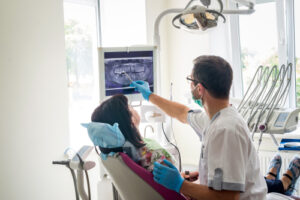If oral cancer is not found and treated promptly, it can have devastating effects. Regular oral cancer screenings are essential for spotting early warning signs of the disease, increasing the likelihood of effective treatment, and enhancing general oral health. This article seeks to give readers a thorough grasp of oral cancer screening, including its significance, method, and advantages, enabling them to prioritise their mouth health and overall well-being.
How to Screen for Oral Cancer
Dental experts do oral cancer screenings as a preventive approach for early indications of mouth cancer or precancerous diseases. The oral cavity, including the lips, tongue, gums, cheeks, and throat, are thoroughly examined. The screening procedure aids in finding any anomalies indicative of oral cancer, such as tumors, lesions, or discolored patches.

Who Needs to Be Screened?
Everyone should get an oral cancer screening regardless of age or risk factors. It’s vital to remember that anybody can acquire oral cancer, even though certain variables including alcohol and cigarette use, a family history of the disease, and exposure to the human papillomavirus (HPV) raise the risk. For people, normal dental visits should include regular screens to ensure early identification and rapid action as needed.
How to Screen for Oral Cancer
An oral cancer screening involves thoroughly examining the entire oral cavity by a dental specialist who will assess any potential abnormalities using various techniques. These techniques could involve:
- Visual Inspection: The dentist visually examines the lips, tongue, gums, cheeks, and throat to look for any outward indications of oral cancer, such as ulcers, patches of white or red skin, or strange growths.
- Physical palpation: To find any lumps, masses, or other anomalies, the dentist softly touches the tissues in the neck and oral cavity.
- Additional Diagnostic Equipment: To improve the accuracy of the examination, dental practitioners occasionally employ extra diagnostic equipment such as instruments or tests for detecting oral cancer. These instruments can help to identify precancerous or cancerous cells or highlight aberrant tissue.
Advantages of screening for oral cancer
The benefits of routine oral cancer screening for people’s dental health and general well-being are numerous:
1. Early Detection: The likelihood of successfully treating oral cancer is greatly increased by early detection. Early detection of anomalies allows for fast intervention, improving treatment outcomes and saving lives.
2. Preventive treatments: Dental practitioners can suggest preventive treatments to slow or stop the progression of precancerous diseases if they are identified during the screening. This may involve making lifestyle changes, such as giving up alcohol or tobacco, and routine monitoring to make sure the condition does not progress to oral cancer.
3. Peace of Mind: Knowing their oral health is being proactively checked, thanks to routine oral cancer screenings gives them peace of mind. People can reduce their worry and uncertainty about oral health problems by being proactive about their dental health.
Conclusion
Maintaining ideal dental health and general well-being requires regular oral cancer screenings. Regular screenings enable people to identify oral cancer or precancerous disorders in the earliest stages, enabling prompt treatment and better outcomes. Dental specialists are essential in conducting thorough examinations and offering advice on preventive measures. Regular oral cancer screenings are a top priority because they enable people to take charge of their oral health and guarantee a healthier future. Remember that maintaining a healthy smile and supporting general wellness depend on prevention and early detection.